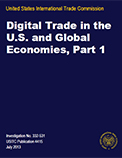
Digital trade -- products and services delivered via the Internet -- makes up a growing segment of the U.S. economy and is increasing globally as well, reports the U.S. International Trade Commission (USITC) in its new publication.
Completed at the request of the U.S. Senate Committee on Finance, the report provides information on the role of digital trade in both U.S. domestic commerce and international trade.
It describes notable barriers and impediments to digital trade and outlines potential approaches for further assessing the role of digital trade in the economy. The report is the first of two requested by the Committee. The Commission’s findings include:
- The Internet and Internet technologies benefit both producers and consumers. Producers gain from lower costs and more efficient business practices. Consumers benefit from improved access to products and services, more choice, and greater convenience.
- As they expand their business operations, the products and services offered by the leading companies with a large online presence are increasingly likely to include some, if not most, of the following: communications services (such as email, voice, and instant messaging), entertainment, social networking, information search/retrieval, productivity enhancement (including data storage and analysis, productivity-enhancing software, and logistics services), and e-commerce.
- The economic effects of digital trade on the U.S. economy vary by sector. For music, games, and videos, the share of digital sales has rapidly increased over the last few years, partially offsetting declines in revenues from physical sales. E-book sales are increasing as well, although revenue from e-books still accounts for a small share of total book sales.
- Social networking and user review sites increasingly act as advertising and marketing venues as they become more integrated with online content providers. Retailers account for a large portion of the advertising revenues earned by social networking sites.
- Technologies such as cloud computing -- the delivery of software and other computer services via the Internet -- are transforming the provision of information and communications technology (ICT) services.
- Internet technologies have transformed how most goods and services in the economy are produced by helping firms lower their costs and operate more efficiently while giving consumers improved access to a wider range of products and services.
- U.S. exports of digitally enabled services (one measure of international digital trade) grew from $282.1 billion in 2007 to $356.1 billion in 2011, with exports exceeding imports every year during that period. Europe, with its strong Internet infrastructure, is the most important regional trading partner for the United States. Europe is also an important destination for U.S. digital trade-related foreign direct investment.
- Notable barriers and impediments to digital trade identified by industry representatives and experts included concerns about localization requirements, divergent data privacy and protection rules, inadequate intellectual property protection and unclear legal frameworks, growing online censorship, and traditional impediments such as burdensome customs procedures that particularly impact small and medium-sized enterprises.
- Studies that have quantified the economic contributions of the Internet have generally found that it has made significant contributions to U.S. output, employment, consumer welfare, trade, innovation, productivity, and corporate financial performance.
View the publication at: http://www.usitc.gov/publications/332/pub4415.pdf


















